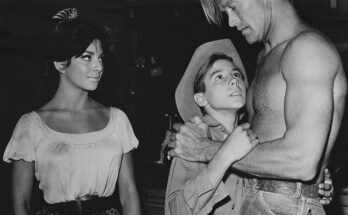The biggest political mistakes of both the past and present are debated ceaselessly, but governance-related blunders aren’t the only miscalculations that can change the world. In fact, some of the biggest mistakes in American history were unrelated to politics. Important and impactful gaffes can occur in any field – including science, engineering, business, and the military – and their consequences can often impact all of society.
Some of those mistakes have been so impactful that they’ve changed the course of American history, especially when they coincide with important events. Errors in judgment or judiciousness can happen to anyone, but only a select few are unfortunate – or in some cases, fortunate – enough for their screwups to alter the history books in a major way. It’s safe to say the modern United States of America would not exist as it does now without a handful of notable bungles along the way.
- Photo:
- user uploaded image
-
- Photo:
- L. Prang & Co.
- Wikimedia Commons
- Public Domain
Columbus Miscalculated His Way Into ‘Discovering’ The New World
The Mistake: The notion that Christopher Columbus set sail to disprove the flat Earth theory has long been debunked, but his legendary 1492 voyage did draw inspiration from a scientific misconception of his own. Columbus’s journey to the New World was made possible by a handful of critical miscalculations on his part, including the failed conversion of Arabic miles to Roman miles and misguided corrections to old maps. As a result, Columbus planned his trip to Asia using calculations that were 8,000 miles off.
The Consequences: Because of Columbus’s mismeasurements, he anticipated a far simpler westward trip from Europe to Asia than what he encountered. This error allowed him to stumble upon the New World amid his journey. The consequences of that discovery were as devastating to the native populations of the Americas as they were vital to the further development of Western civilization.
- Photo:
-
-
- Photo:
- Unknown
- Wikimedia Commons
- Public Domain
Misread Gauges At Three Mile Island Prevented Acceptance Of Nuclear Power
The Mistake: The partial meltdown at Three Mile Island occurred on March 28, 1979, and remains the most serious nuclear disaster in American history. It happened due to an unlikely combination of malfunction and human error. After a relief valve for the reactor core became stuck open, plant staff were unable to read the signs of impending trouble on their array of gauges until it was too late.
The Consequences: Although nobody perished during this event at Three Mile Island, and any adverse health effects caused by the release of radiation have been minimal, the real consequence was Americans’ distrust of nuclear power. The incident at Three Mile Island essentially ended any chance the United States had of adopting such energy in greater force. This resulted in further reliance on climate-harming fossil fuels. It wasn’t until 2024 that Three Mile Island was acquired by Microsoft to be reopened in 2028.
- Photo:
-
-
- Photo:
- Wilson44691
- Wikimedia Commons
- CC BY-SA 3.0
A Dropped Document Aided The Confederacy’s Defeat
The Mistake: In the early stages of the American Civil War, the Confederate Army seemed poised for victory. As the rebels headed further and further north, winning several key victories along the way, General Robert E. Lee concocted “Special Orders No. 191,” an 1862 plan to take control of several important Maryland locations. One copy of these orders, however, was somehow lost, only to be picked up by a Union soldier. The leaked details of Lee’s plan allowed the Union to defeat him at South Mountain and Antietam.
The Consequences: While the exact importance of South Mountain and Antietam are up for historical debate, at the very least, they’re both recognized as turning points in the conflict. The discovery of “Special Orders No. 191” allowed the Union to stop Lee’s northward march in its tracks and firmly turn the tide. The victory at Antietam also provided the pretext Lincoln needed for issuing his Preliminary Emancipation Proclamation, which transformed the Union cause into a crusade against slavery.
- Photo:
-
-
- Photo:
- Unknown
- Wikimedia Commons
- Public Domain
The Bay Of Pigs Plan Failed In Part Because The Air Force Forgot About Time Zones
The Mistake: The United States made several attempts to topple Fidel Castro’s government in Cuba, but the most concerted effort was the failed Bay of Pigs invasion that occurred under the Kennedy administration. The Americans landed some 1,200 soldiers – mostly Cuban exiles – on the shores of Cuba on April 17, 1961, a force meant to be backed by air support. The six B-26 planes arrived unescorted, as the Air Force forgot to consider the one-hour time zone difference when dispatching them from Nicaragua to Cuba.
The Consequences: The planes fell to Castro’s T-33s, ground forces were overwhelmed, and the vast majority of the intruders were either captured or slain. The incident was an unmitigated failure and drastically increased tensions between the United States and Cuba – which culminated in the Cuban Missile Crisis.
- Photo:
-
-
- Photo:
- 509th Operations Group
- Wikimedia Commons
- Public Domain
A Mistranslation Influenced Truman’s Launches On Japan
The Mistake: When the United States delivered its terms of surrender to Japan in July 1945, the world breathlessly awaited their response. Japanese Premier Kantaro Suzuki told reporters he had no comment at the moment, and he used the phrase “mokusatsu” – or “silence” – to express his message of patience. Unfortunately, mokusatsu has multiple meanings, and the press chose the translation that read “to ignore with silent contempt.” Miffed by the seemingly flippant statement, President Harry Truman proceeded with the planned devastation of Hiroshima and Nagasaki.
The Consequences: Had the phrase not been mistranslated, perhaps the bombs would not have been dropped, and Japan would have peacefully surrendered. This was not the case, however, and as a result, the world has been caught up in an arms race ever since. But even more devastating was the loss of Japanese life that resulted from the event.
- Photo:
-
-
- Photo:
- Emmanuel Leutze
- Wikimedia Commons
- Public Domain
Americans Won Their Independence Because A British Commander Ignored A Note
The Mistake: George Washington’s crossing of the Delaware is one of the most iconic moments in US history, and his subsequent defeat of the Hessian forces on the other side was a vital victory in the American Revolution. But this victory almost never occurred.
A local farmer arrived at the Hessian camp beforehand warning of Washington’s approach, but Colonel Johann Rall was busy playing cards and refused to see him. The farmer wrote him a note explaining the dire circumstances, but Rall – a German-speaker who couldn’t decipher the message English – stuffed it in his pocket and returned to his game. That morning, Washington caught the Hessians by surprise.
The Consequences: Washington’s victory at Trenton was as decisive as it was important to America’s eventual independence. More than two-thirds of the Hessian forces were captured, and the Revolutionary Army gained a foothold in New Jersey. Rall and over a dozen others paid for the mistake with their lives.
- Photo:
-
-
- Photo:
- Cherie A. Thurlby
- Wikimedia Commons
- Public Domain
Poorly Sourced Intel Was Used To Justify The Iraq War
The Mistake: It’s now widely accepted that the 2003 Iraq War was precipitated on false allegations of Saddam Hussein’s connection to 9/11 and possession of WMDs. The Bush administration, and in particular Donald Rumsfeld and Dick Cheney, allegedly misconstrued intelligence in an attempt to provoke conflict, but this intelligence was poorly delivered to the administration from the outset. In particular, the reports were strangely sourced, and these dubious sources were presented as equal or superior to contradicting reports from expert organizations.
The Consequences: The US is still very much embroiled in the Iraq conflict. The end of the Hussein regime – and the ensuing power vacuum – led to the rise of ISIS and the outbreak of a new regional conflict.
- Photo:
-
-
- Photo:
- MetalGearLiquid
- Wikimedia Commons
- CC BY-SA 3.0
Xerox Gave Away Industry-Defining Tech Secrets To Steve Jobs
The Mistake: In 1970, Xerox created the Palo Alto Research Company – PARC for short – and began pumping out countless tech innovations. At the same time, Steve Jobs and the minds at Apple had hit some roadblocks and were looking for new ideas. Jobs requested access to the PARC facility for three days, and the executives at Xerox agreed – in exchange for a pre-IPO investment in Apple. Xerox got 100,000 shares in the young company for just $10 apiece, while Jobs and his team got to witness the innovations the Xerox team was introducing to computing.
The Consequences: Jobs and his co-workers at Apple had already made numerous strides in the personal computer world, but the concepts they saw in action at PARC helped revolutionize the company’s direction moving forward. Innovations like the use of a mouse, a graphic user interface, and other user-friendly designs, were adopted for the advent of the Lisa and Macintosh computers. As a result, Apple set itself on the path to its current dominance in the tech industry – and Xerox got a hefty return on their investment.
- Photo:
-
-
- Photo:
- White House photo by Eric Draper
- Wikimedia Commons
- Public Domain
The Bush Administration Ignored Key Warnings About 9/11
The Mistake: The events of September 11, 2001, caught the entire world by surprise – but some believe the United States government should have seen it coming. The Bush administration received countless intelligence reports in the leadup to 9/11 that pointed toward a coordinated strike against the mainland by Osama bin Laden. These warnings were ignored until it was too late.
The Consequences: The strikes claimed nearly 3,000 lives – and the number grew as people began succumbing to debris-related illnesses. The entire event continues to define the United States’ worldwide military purpose and changed the course of history in the Middle East. On the homefront, it led to laws like the Patriot Act, which many believe has eroded Americans’ liberties and privacy rights.
- Photo:
-
-
- Photo:
- Mike Fleshman
- Wikimedia Commons
- CC BY-SA 2.0
Lenders Gambled On Subprime Loans And Caused The Mortgage Crisis
The Mistake: The American housing market soared in the early 2000s, with sales reaching record highs and more individuals owning homes than ever before. Financiers attempted to cash in on this prosperity by offering “subprime” mortgages to those with little-to-no documentation who were later unable to repay their loans. As the record number of homeowners turned into a record number of people unable to pay off their mortgages, foreclosures loomed and the Mortgage Crisis began.
The Consequences: The effects of the Mortgage Crisis are still fresh in American society. The housing market has never fully recovered, and owning a home is difficult, especially for members of younger generations. With fewer Americans able to own homes, a bevy of economic consequences followed.
- Photo:
-
- Photo:
- Gilbert Stuart
- Wikimedia Commons
- Public Domain
Congress Forgot To Ratify The 27th Amendment For 200 Years
The Mistake: The 27th Amendment to the Constitution was suggested by James Madison in 1789. It read, “No law, varying the compensation for the services of the Senators and Representatives, shall take effect until an election of Representatives shall have intervened.” In essence, this meant the Senate and Congress couldn’t change their salaries in the middle of their terms. Though the 27th Amendment was not initially ratified, support remained strong – until everyone forgot about it and the amendment slipped into obscurity.
The Consequences: Though adopted over the years in several states, the “lost” amendment remained unratified by the whole of the country until a university student in Texas wrote a paper on the subject in 1982. He began campaigning for its implementation and was eventually successful – the 27th Amendment was fully ratified in 1992.
- Photo:
-
-
- Photo:
- NASA/JPL
- Wikimedia Commons
- Public Domain
A $125 Million Mars Orbiter Was Lost Because Engineers Used The Imperial System
The Mistake: The Mars Climate Orbiter was launched in 1999 with the intention of observing the red planet’s weather up close. Instead, the orbiter hit the top of Mars’s atmosphere and was rendered inoperable. The doomed journey was the result of a single piece of software from Lockheed Martin, a company that typically worked in imperial units. The NASA software was expecting metric units and failed to convert the information from pounds to newtons.
The Consequences: The failed mission of the Mars Climate Orbiter was a waste of approximately $125 million. It was also the kind of PR nightmare NASA did not need: Mars-related research continues to be underfunded.
- Photo:
-
-
- Photo:
- Rept0n1x
- Wikimedia Commons
- CC BY-SA 3.0
Blockbuster Passed Up The Chance To Buy Netflix And Wound Up Essentially Out Of Business
The Mistake: Blockbuster Video was once the king of the movie rental game, but they’ve since faded into obscurity. Arguably, the knell of their demise came in 2000 when CEO John Antioco was approached with an offer to purchase Netflix – then a DVD mailing service – for the bargain price of $50 million. Antioco turned them down.
The Consequences: Netflix eventually turned their business model toward streaming video, eventually becoming a multi-billion dollar company. They also made physical video rentals more or less irrelevant, resulting in the disappearance of all but one Blockbuster store.
- Photo:
-
-
- Photo:
- Guam
- Wikimedia Commons
- CC BY 3.0
Percy Spencer Invented Microwaves Thanks To A Melted Chocolate Bar
The Mistake: Percy Spencer was an employee of Raytheon, one of the country’s leading producers of magnetrons. He habitually stood next to active magnetrons, and in 1945, he made a shocking discovery: a chocolate bar in his pocket had melted. He experimented with a bowl of unpopped popcorn, which popped in front of the magnetron. Spencer knew he had an exciting innovation on his hands, and not long after, he invented the microwave oven.
The Consequences: Spencer’s discovery of microwaves – and the invention of an oven that makes use of them – has dramatically impacted American history. Microwave-based technology has had numerous applications that extend far beyond the heating of food, including innovations in radar.
- Photo:
















